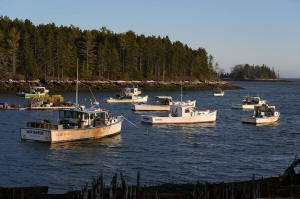Fishermen say Trump's DOGE budget cuts are preventing them from adopting
climate-friendly technology
[March 19, 2025] By
PATRICK WHITTLE
BREMEN, Maine (AP) — Commercial fishermen and seafood processors and
distributors looking to switch to new, lower-carbon emission systems say
the federal funding they relied on for this work is either frozen or
unavailable due to significant budget cuts promoted by President Donald
Trump’s Department of Government Efficiency.
The changes are designed to replace old diesel-burning engines and
outdated at-sea cooling systems and are touted by environmentalists as a
way to reduce seafood's carbon footprint. Salmon harvesters in
Washington state, scallop distributors in Maine and halibut fishermen in
Alaska are among those who told The Associated Press their federal
commitments for projects like new boat engines and refrigeration systems
have been rescinded or are under review.
“The uncertainty. This is not a business-friendly environment,” said
Togue Brawn, a Maine seafood distributor who said she is out tens of
thousands of dollars. “If they want to make America great again, then
honor your word and tell people what's going on."
Decarbonization of the fishing fleet has been a target of environmental
activists in recent years. One study published in the Marine Policy
journal states that more than 200 million tons of carbon dioxide were
released via fishing in 2016.
That is far less than agriculture, but still a significant piece of the
worldwide emissions puzzle. With Earth experiencing worsening storms and
its hottest year on record in 2024, reducing the burning of fossil fuels
across different industry sectors is critical to fighting climate
change, scientists have said.

But climate-friendly projects often cost tens or hundreds of thousands
of dollars, leading fishermen to seek U.S. Department of Agriculture or
Environmental Protection Agency funds to cover some costs. DOGE, a
commission assembled to cut federal spending, has targeted both agencies
for cutbacks.
That has left fishermen like Robert Buchmayr of Seattle on the hook for
huge bills. Buchmayr said he is nearing completion of a refrigeration
project for a salmon boat and was counting on a $45,000 USDA grant to
pay for a chunk of it. The agency told him last month the funding is on
hold until further notice, he said.
“I'm scrambling, where does the money come from. I was counting on the
grant,” Buchmayr said. “I was under the impression that if you got a
grant from the United States, it was a commitment. Nothing in the letter
was saying, 'Yes, we'll guarantee you the funds depending on who is
elected.'”
Fishermen search for answers after getting bad news
The full extent of the cuts is unclear, and fishermen affected by them
described the situation as chaotic and confusing.
Representatives for the USDA and EPA did not respond to requests for
comment from AP about the value of the cuts and whether they were
permanent. Dan Smith, USDA Rural Development's state energy director for
Alaska, said updates about some grants could arrive in April.
Numerous fishermen, commercial fishing groups and advocates for working
waterfronts told AP they learned about the changed status of their grant
money in February and March. Some were told the money would not be
coming and others were told the funds were frozen while they were
subject to a review.
[to top of second column] |

Fishing boats are moored for the evening, Tuesday, March 11, 2025,
in Bremen, Maine. (AP Photo/Robert F. Bukaty)
 Many prospective grant recipients
said they have had difficulty getting updates from the agencies. The
lack of certainty has fishermen worried and seeking answers, said
Sarah Schumann, a Rhode Island fisherman and director of the Fishery
Friendly Climate Action Campaign, a fishermen-led network that works
on climate issues.
“They've started contacting me in the last couple
of weeks because they've had the plug pulled on money that was
already committed,” Schumann said. “If they miss a season they could
go out of business.”
In Homer, Alaska, Lacey Velsko of Kaia Fisheries was excited for her
decarbonization project, which she said hinged on hundreds of
thousands of dollars via a USDA grant to improve a refrigeration
system on one of her boats. The recently completed project burns
less fuel and yields a higher quality project for the company, which
fishes for halibut, Pacific cod and other fish, she said.
But, now the company is told the money is unavailable, leaving a
huge cost to bear, Velsko said.
“Of course we think it was unfair that we signed a contract and were
told we would be funded and now we’re not funded. If six months down
the road we’re still not funded I don’t know what avenue to take,”
she said.
Lack of funding puts businesses in jeopardy
The funding cuts have also hurt seafood processors and distributors,
such as Brawn in Bremen, Maine. Brawn said she received a little
more than half a USDA grant of about $350,000 before learning the
rest might not arrive.
Brawn received the grant for Dayboat Blue, a project that uses a
membership-based model to get Maine seafood to nationwide customers
while reducing the carbon footprint of transportation and packaging.
“This model can really help fishermen, it can help consumers, it can
help communities,” Brawn said. “What it's going to do is it's going
to stop the program.”
The confusion on the waterfront is another example of the bumpy
rollout of government cutbacks under Trump. The Trump administration
halted its firings of hundreds of federal employees who worked on
nuclear weapons programs last month. It also moved to rehire medical
device, food safety and other workers lost to mass firings at the
Food and Drug Administration. New tariffs on key trading partners
have also been chaotic.

In Bellingham, Washington, EPA funding was paused for five engine
replacement projects split between three companies, said Dan Tucker,
executive director of the Working Waterfront Coalition of Whatcom
County. He said the uncertainty about funding has made it difficult
for fishermen to move ahead with projects that will ultimately
benefit their businesses and the community at large.
“A lot of the small guys are like, 'Well, I really want to help out
with climate change but I can't afford it,'” Tucker said.
All contents © copyright 2025 Associated Press. All rights reserved |